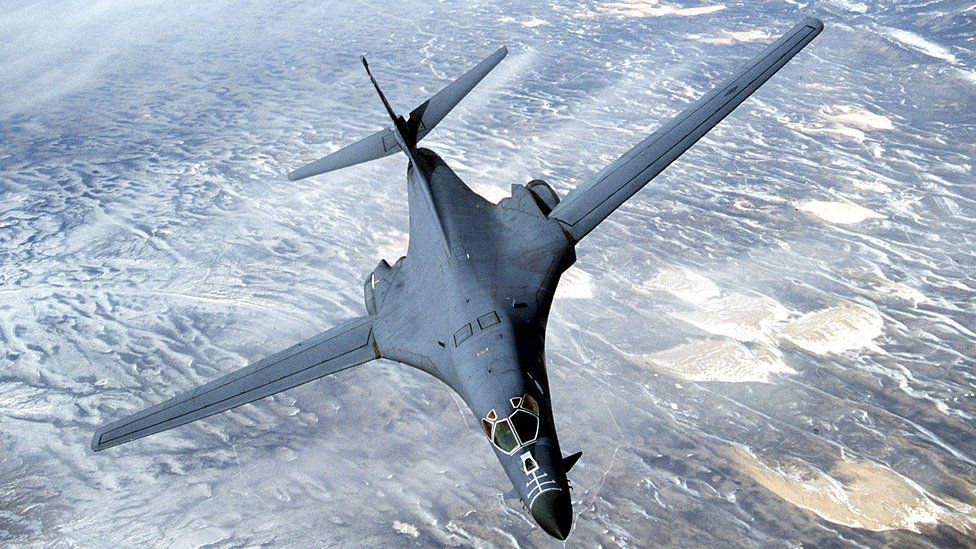What we know about US retaliatory strikes in Iraq and Syria
- Published

US forces have bombed 85 targets in Iraq and Syria as retaliation for an attack that killed three US troops at a base in northern Jordan last month.
According to US officials, the co-ordinated attack was against Iran's Islamic Revolutionary Guards (IRGC) Quds Force and allied militia groups.
US President Joe Biden said the US attacks "will continue at times and places of our choosing".
Critics have argued that the strikes should have occurred earlier.
What do we know about the US operation?
A statement from US Central Command (Centcom) said the attack occurred at 16:00EST (21:00GMT) - which is about midnight local time in the region.
Forces used numerous aircraft, including B-1 "long-range bombers flown from [the] United States" to hit a total of 85 targets at seven sites.
More than 125 precision munitions were used, the statement said.
US General Douglas Sims said the B-1 bombers "flew a single nonstop route from the US" and were able to "gas and go" while travelling in the air.
He added that the US is "pretty confident" that the locations struck were "pretty significant in degrading capability".
"We will know better in terms of what [the assessment] looks like tomorrow," Gen Sims said.
What do we know about the targets?
US officials have blamed an Iranian-backed militia group, the Islamic Resistance in Iraq, for the attack and say the one-way drone was Iranian-made and similar to the ones being supplied to Russia.
The militant organisation - an umbrella group of multiple militias - is believed to have been armed, funded and trained by the IRGC.
Seven locations were hit - four in Syria and three in Iraq - over 30 minutes.
The facilities struck included command and control operations and munition supply chain facilities of "militia groups and their IRGC sponsors who facilitated attacks against US and coalition forces", the Pentagon added.
Also targeted were logistics hubs and drone storage units.
According to reports by AFP news agency, the Syrian Observatory for Human Rights war monitor said at least 13 pro-Iran fighters were killed in eastern Syria.
There were no strikes on Iranian soil and an Iranian warship in the Red Sea, thought to be involved in helping direct Houthi attacks on commercial shipping, was not targeted.
What have US officials said?
In a statement issued by the White House, Mr Biden said his country "does not seek conflict in the Middle East or anywhere else in the world".
But, he warned, "let all those who might seek to do us harm know this: If you harm an American, we will respond".
The attacks came several hours after Mr Biden attended a repatriation ceremony for the remains of William Rivers, 46, Kennedy Sanders, 24, and Breonna Moffett, 23.
More than 40 other service members were injured in the same drone attack, which struck Tower 22 - a US base in north-eastern Jordan.
Republicans criticised the timing, saying that the wait was too long. US officials have said any delay was due to cloudy weather obstructing targets.
Florida Republican Congressman Byron Donalds, speaking to Fox News after the US attack, said "these strikes should have occurred later on that same day when our service members were killed."
After the attack, White House National Security Spokesman John Kirby said the US has had no communications with Iran since 28 January - the day the drone attack occurred.
How will Iran and the militias respond?
Iran has denied any role in the Tower 22 attack.
"No threat will be left unanswered," Revolutionary Guards commander Major General Hossein Salami, who advises Supreme Leader Ayatollah Ali Khamenei, said on Wednesday, before the US retaliation began.
Watch: Parents of US soldiers killed: 'I'm still in shock'
His remarks came a day after Amir Saeed Iravani, Iran's ambassador to the UN, told Iranian journalists in New York that Tehran would "decisively respond" to any attack on the country, according to the state-run Irna news agency.
Experts believe that the nearly-one week delay was intended to allow Iran to withdraw personnel, potentially avoiding a wider conflict.
"If you know you're a target, you simply disappear," one Iraqi official told BBC News.
One possible response by Iran could resemble what occurred in the days after the US assassination of the IRGC general Qasem Soleimani.
Five days after the assassination, Iran fired volleys of ballistic missiles at US bases in Syria, after giving the US several hours' notice.
With reporting by Bernd Debusmann, Jonathan Beale, Hugo Bachega